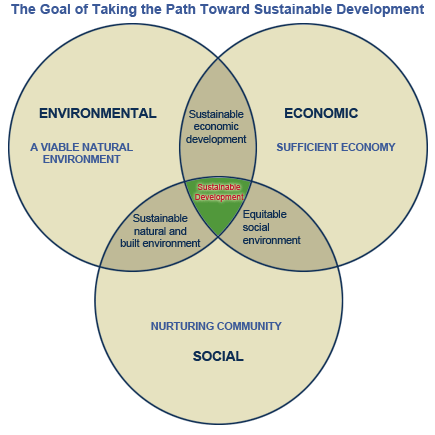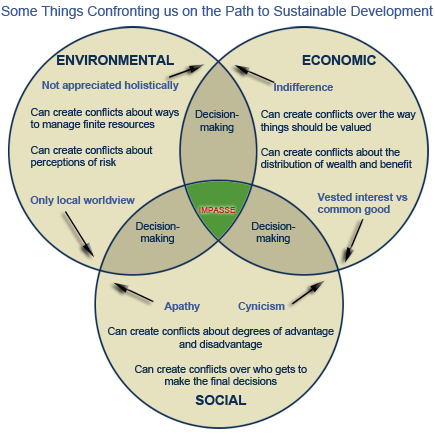Certificate IV in Understanding and Negotiating Sustainability Issues

This is a sustainability skills training course that has been developed and is delivered by Dr. Judith Morrison, BA, Grad Dip (Aboriginal & Intercultural Studies), M. Litt (Peace and Conflict Studies) PhD (Peace, Conflict & Sustainability)
What you will learn from this sustainability skills training course
Across a wide range of industries and enterprises training is now being developed and offered to try and make all sorts of workplace environments and practices more sustainable. Some can be described as innovative ‘green skills’ training programs that reflect practical efforts to put in place more efficient ways of generating and using energy or managing natural resources such as water. However, the present course reflects the need for another set of sustainability skills that are just as crucial – those to do with communicating ideas about sustainability back and forth between people who come from very different backgrounds. These kinds of skills are vital to work toward developing common ground as we try and negotiate a sustainable way forward with one another.
This course will help you develop:
- a better general understanding of the principles and ethos of sustainability
- capacity to make informed sustainability assessments in workplaces and other situations
- capacity to plan for participation in collaborative multi-party decision-making or problem-solving processes
- capacity to predict and alleviate the risk of pitfalls that often undermine cross-sectoral negotiations
- capacity to engender an interest in maintaining sustainable relationships even when contention threatens to erode goodwill

The first part of the course helps you develop a framework for understanding and becoming more personally engaged with ideas about sustainability and how to apply the principles to real-life situations, whatever your own particular interests or line of work. The training is relevant irrespective of whether a workplace is primarily concerned with the management of natural resources, the management of built environments or the provision of services to communities. This course will give you an edge as businesses and organisations increasingly respond to the call to take sustainable development into account in all aspects of their work. For instance, many of us have only a scant, if any, understanding of the 'triple bottom line'. The course will give you useful tools for grasping the 'triple bottom line' idea and will increase your capacity to convey its meaning in everyday situations. Sustainability issues are broken down so as to be able to make the necessary degree of separation between their economic, social and environmental components. These exercises in turn consolidate a capacity to convey how different components need to come together in an integrated approach.
It is the second element of the course that makes it most unique in terms of sustainability skills training. It will also help you develop a framework and a set of skills that are vital in situations where people have to negotiate a sustainable way forward with groups or organisations that have a very different work ethic or cultural background from each other. Sustainability issues emphasise a need for planners working in the government sector, the business sector and the community to look beyond their own knowledge silos and forge a greater degree of consensus and common ground. There are growing demands on governments, businesses and community leaders to make plans and decisions together so as to meet our social and environmental needs not only in the present, but into the future. Yet we are often painfully aware of the extent to which negotiations between stakeholder groups founder and collapse.

Even where it is evident that issues require urgent resolution, attempts to find consensus often fail because those who participate have little or no formal training in negotiation skills. In particular they lack the crucial mix of negotiation skills that are necessary to deal with sustainability issues. We need more than wishful thinking to encourage and support constructive dialogue between stakeholders who have to work through significant differences. Stakeholders who cannot work through issues together often find themselves at an impasse, which further paralyses their capacity for collective, collaborative decision-making. Investing in training that helps us prepare, both practically and psychologically, to deal with the challenges of negotiating sustainability issues is one strategy for avoiding the high and often counter-productive costs of stalemate or litigation that ensue from such impasses. We may have to re-think what we mean by a ‘successful’ negotiated outcome. Even when stakeholders haven’t been able to find a durable, mutually satisfactory and therefore ‘successful’ outcome, they may nevertheless have been able to maintain a ‘successful’ process, in the sense that they maintained their motivation to try and negotiate effectively through their complex and seemingly intractable problems.
One of the most important insights that people gain through doing this course is that negotiators in today’s complex decision-making and planning environments need more than natural, intuitive ability and good intentions. They need specialised training and skills to anticipate and hopefully avoid some of the communication traps that can undermine complex decision-making and problem-solving processes involving a range of stakeholders. The course brings home the point that cross-sectoral and cross-cultural consultations and negotiations require competencies and skills well beyond those required for day-to-day engagement within one particular work sector or industry, or within one particular cultural context. They cannot all be learnt within this short course, but what you gain from the course is a framework to help you assess what skills are most crucial in a particular type of negotiation scenario and how they might be obtained. You will have access to invaluable resources for further guidance.
Explanation about the qualification level and entry requirements
The Australian Qualifications Framework (AQF) is a quality assured national framework of qualifications in the school, vocational education and training (VET), and higher education sectors in Australia. In the VET sector, competencies and skills are usually linked to Training Packages developed within specific industry skills training areas. Training pathways allow students to attain lower-level qualifications (Certificate I, II or III) signifying that they have learnt about relatively simple and routine matters associated with specific workplace environments. Courses accredited at the level of Certificate IV cover “a breadth, depth and complexity of knowledge and competencies that can be applied to a broader range of activities or applications in a variety of contexts”. Students develop capacity to “perform a broad range of skilled applications, including capacity to evaluate and analyse current practices, develop new criteria and procedures for performing current practices, and provision of some leadership and guidance to others in the application and planning of the skills”. These features distinguish Certificate IV courses from those offered at the level of Certificate I, II or III.
Certificate IV in Understanding and Negotiating Sustainability Issues (51817) has been accredited as a stand-alone course, rather than as a course tied to an industry Training Package. This is because the sustainability skills training it provides is of a more generic nature, and will be useful in a wide range of contexts. It is particularly useful for people already in, or about to enter the workforce who would not necessarily qualify for, or even consider embarking on, a higher education degree. It is offered at the Certificate IV level in recognition of the fact that sustainability now requires us to look at issues in new ways, rather than to simply learn about accepted ways in which matters have routinely have been dealt with in the past. The skills developed through this sustainability skills training course are concerned with capacity to organise activities or look for solutions of a non-routine or contingency nature.
There are no stringent entry requirements. The skills that are offered can be usefully taken up by anyone who wants to apply ideas about sustainability within their present occupational or professional role wherever they live, either in Australia or elsewhere. As a component of professional development this qualification will ensure you are recognised as having some degree of authority to speak about sustainable development in your workplace and in other forums. The expertise gained will be valued and sought in a wide range of public and private sector planning activities.
How the course is delivered
These days e-learning through online delivery is perhaps the simplest and most effective way of taking the course. Participants have the flexibility to log on to sessions at times that suit their own circumstances, and there is scope to go through previous training sessions again before moving on. However, the course can also be delivered 'on the job' in a specific workplace environment, or delivered face-to-face at designated training venues in any part of Australia. The contact hours are equivalent to at least four full days of training.
If you’ve never been involved with e-learning, don’t feel daunted! E-learning training sessions require only minimal preparation and outlay and time is made available at the beginning of the course to ensure participants are familiar with the software program and can use it to best effect. Virtual e-learning classrooms give participants flexibility for one-on-one dialogue with the trainer as well as opportunities to interact with other participants. Training sessions can be tailored to suit the needs of particular businesses and organisations that recognise the benefit of a number of employees participating at the same time.
Cost: AU$2,500 incl. GST
Go to What’s Covered in the Course for more details about the course.
Contact Dr Judith Morrison by email if you want to know more about the course, when and where it’s offered, and how to register. Contact me also if you are an academic who shares an interest in education about sustainability and how it needs to be tied in with the theory and practice of conflict resolution. I am always interested to hear from people whose background would make it possible to establish a training partnership. Make contact even if it is just to suggest better ways of getting the message across on this website!
2 Garden Street,
Swanbourne Western Australia 6010
Phone: +61 8 9384 2136
Fax: +61 8 9384 2136


